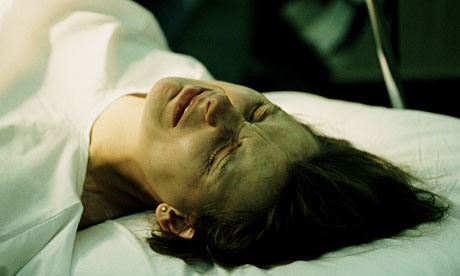
What does giving birth feel like? It's become a pressing question for me, as I'm due to do it myself in five weeks' time. No one can give me an answer. "Oh, it's an unforgettable experience," mums coo. Then add, "I can't describe it; you forget the pain." Make your mind up!
Can literature provide an answer? Surely one of the greats has nailed it, and can explain how an event can be simultaneously unforgettable and impossible to remember?
My antenatal teacher claims the best description of labour in literature was written by a bloke. The birth of Kitty's baby in Tolstoy's Anna Karenina is such an accurate portrayal of the transitional stage of labour (when we start swearing at men for getting us into this mess, demanding back-massages and shrieking when touched) that Tolstoy must surely have based it on personal experience of the births of his 13 children.
The father-to-be, Levin, is mystified as his wife swerves from screaming agony to peaceful tranquillity. She cries out in pain then starts knitting, grabs his hand then pushes him away. "'Don't leave, don't leave! I'm not afraid, I'm not afraid! ... Mama, take my earrings. They bother me. ... No, it's terrible! I'll die, I'll die! Go, go!' she cried, and again came that scream that was unlike anything in the world."
Convinced she's dying, Levin sees her grief and joy as "holes in this ordinary life, through which something higher showed".
If Tolstoy's labour scene is beautiful, ending with the appearance of the baby "like a small flame over a lamp", elsewhere in literature, birth gets nasty. In the unforgettable opening paragraphs of Patrick Suskind's Perfume, a woman squats under a fish stall in stinking, fetid 18th-century Paris, pushes out a "mess", a "thing", and leaves it for dead. It's not such a surprise that the child grows up to be a serial killer.
Laurence Sterne's Tristram Shandy also suffers a traumatic birth; the doctor crushes his nose with forceps. In fact, the whole book is a painful labour to push out a life story. Tristram can't decide where he begins, literally. Never mind birth, what about conception? The character of your parents? He finally gets round to the labour in volume III, and the book ends four years before he's conceived.
Mary Shelley's Frankenstein contains a kind of male labour for Victor Frankenstein, whose "toils" and "agony" bring his creation to life with "a convulsive motion". But it's no natural birth, and Shelley makes sure we get her point by killing off mothers left, right and centre. Ask too many questions, mess with the secret of life itself, and the results aren't pretty.
Or there's Sylvia Plath, who hints at post-natal depression in her poem Morning Song. Here birth isn't joyful, it's a harsh, mechanical process, beyond a woman's control: "Love set you going like a fat gold watch. / The midwife slapped your footsoles"
Other female authors have explored the ambiguities of birth and ownership. In Toni Morrison's Beloved, set in the American South, birth is part of a human production-line: slaves don't own their babies. But the traumatic memory of giving birth on the run from slave-catchers, the baby "face up and drowning in its mother's blood", itself becomes a possession, passed on to a new generation. "Some things you forget. Other things you never do." Humanity has been infertile for 25 years in PD James's Children of Men – so when a woman finally becomes pregnant, birth becomes a matter of power. In a scene with biblical echoes, the expectant mother, on the run from State police, is forced to give birth in a remote shed, delivering a potential saviour of the human race. In Margaret Atwood's The Handmaid's Tale, meanwhile, fertile women are forced to produce babies for a sterile ruling class. In a bizarre birth scene, the wife of a Commander sits with legs either side of a labouring handmaid, ready to take possession of the baby. The women don't even own the pain of birth: "...who can remember pain, once it's over? All that remains of it is a shadow..."
I'm not sure any of this is answering the big question, but these beautiful words from Charlotte's Web - "Life is always a rich and steady time when you are waiting for something to happen or to hatch" - stick with me as I wait for my own life-shaking event. EB White's classic starts with the birth of the piglet Wilbur, who faces death by the farmer's axe before he's a day old, and ends with the demise of the wise spider Charlotte and the hatching of her 514 children. Birth and death, loss and joy ... it's not so far off Tolstoy.

